Breaking the ice with a group of first-year students, Darby Ray says, “Tell me, in one word, how you’re feeling.”
It’s a morning in late August and the group fills a lounge in Bates’ Harward Center for Community Partnerships. Ray, the Harward Center’s director, goes on to label her own mood: curious.
The students chime in. One, like Ray, is curious. Another is surprised, a third anxious. Nervous, observant, happy — all perfectly credible feelings for students new to college.
But these young adults are “new to college” in a way that’s uncommon in the Class of 2021 and at Bates generally: They are among the 66 members of the incoming class, or about 13 percent, who represent the first generation of their families to go on to higher education.
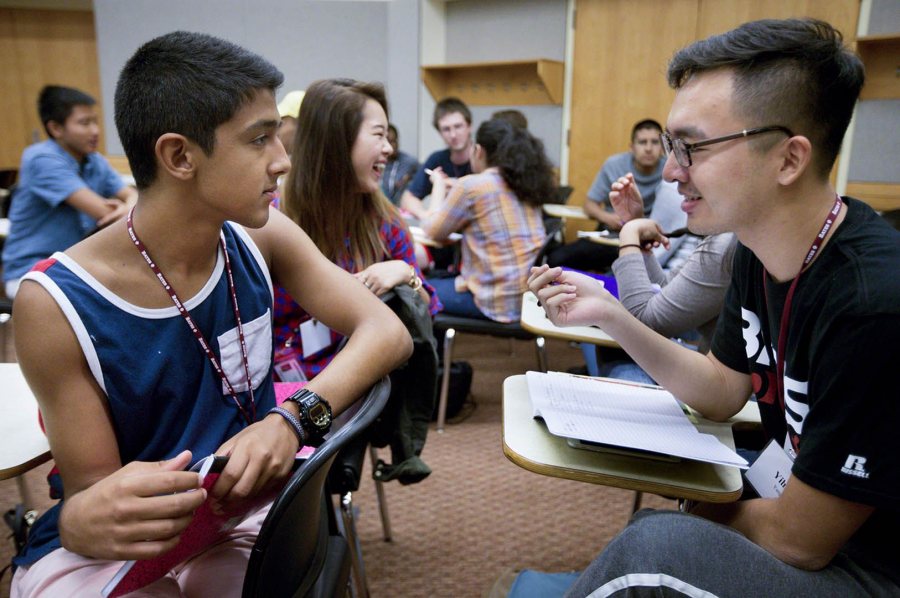
Members of the Class of 2020 get acquainted during an academic-planning session in August 2016 as part of the Bobcat First! program. The college’s record of supporting student success garnered an invitation to the American Talent Initiative, an effort to expand college access for low-to-moderate-income students. (Phyllis Graber Jensen/Bates College)
This first-generation leap forward comes with some distinctive experiences. Equipping first-gen students to encounter those experiences is the Bates initiative Bobcat First!, now in its third year. The program builds community and a sense of belonging for first-gens, and enriches their understanding of the (often unspoken) rules for navigating college.
“There’s no one in our families to talk with us about their college experiences.”
Bobcat First! provides practical know-how, networking support, and, crucially, a certain sense of identity and self-confidence — all designed to promote participants’ success at Bates and beyond. Nationally, degree attainment for first-gen students tends to lag behind continuing-generation students. (Over a six-year average, 4 percent fewer first-gens in the cohorts starting at Bates from 2007 to 2010 attained a degree than continuing-generation students.)
“First-generation students don’t have the same resources as students whose parents have college degrees,” says Nina Flores ’20 of Floresville, Texas. One of 30 B1st participants in 2016, Flores is now a peer mentor in the program.
“There’s no one in our families to talk with us about their college experiences,” she explains. That means, among other things, that academic customs, procedures, and jargon can come as a complete surprise to the first-gen student.
“And often we come from school systems that leave us less prepared for college courses,” Flores continues. “It’s a lot of pressure to keep yourself motivated, especially if there’s no one at home who can relate to the difficulties and guide us through them.”
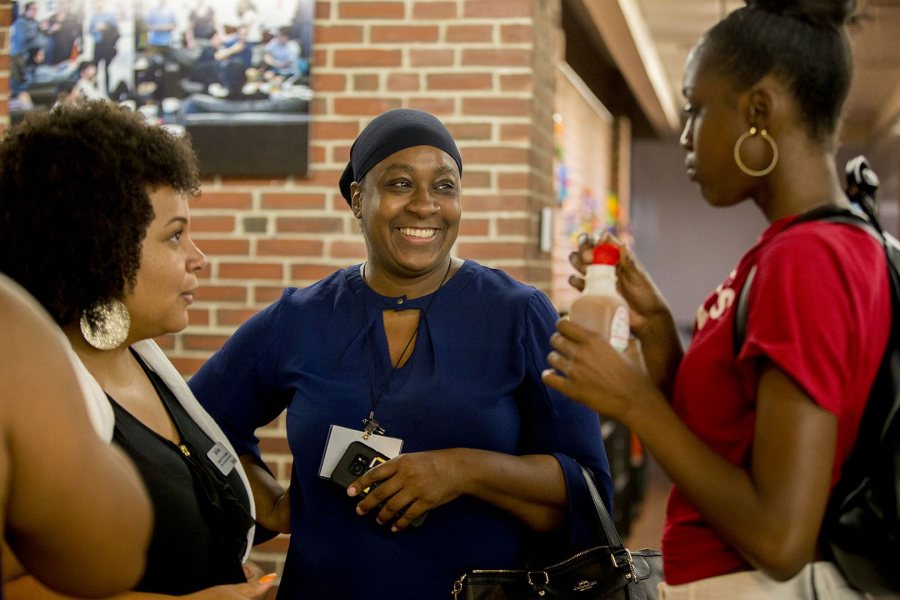
Bobcat First! family members talk with co-director Julisa De Los Santos (left) during a reception at the Office of Intercultural Education during Back to Bates Weekend attended by President Clayton Spencer and other college leaders. (Phyllis Graber Jensen/Bates College)
A yearlong program for each cohort of first-year, first-generation students, B1st consists of an immersive week on campus just prior to regular first-year orientation, followed up throughout the academic year with monthly group lunches and other gatherings, both social and informational. The program is opt-in: Roughly half of eligible students chose to take part both this year and last.
During that initial August week, participants “live together and participate in programs designed to help them transition and feel at home here,” explains Jessica Perez, assistant dean of students for student transition and support. She co-directs the program with Julisa De Los Santos, interim director of the Office of Intercultural Education. “So by the time regular Orientation starts, they are feeling pretty good about being here.”
During the 2017 pre-orientation week, participants resided in Small and Cheney houses, wood-frame houses a few doors apart on College Street.
“By the time regular orientation starts, they are feeling pretty good about being here.”
Faculty and staff led workshops on such practical topics as time management, student employment, and academic planning. There were visits to campus departments and resources, such as the session that introduced the group to the Harward Center.
First-gens, says Perez, may “walk into a college not knowing what ‘office hours’ are. When a professor says, ‘Sign up for office hours,’ you’ve never heard that phrase before. It’s helpful for someone to actually define that.”
“Talking to professors was a lot easier” after the pre-orientation week, says Ryan Lizanecz ’20 of Portland, Maine. Like Flores, he was in B1st in 2016, the inaugural year for the current programming, and is now a B1st peer mentor. “Talking to, really, any staff or faculty, being comfortable on campus — just everything was so much easier.”
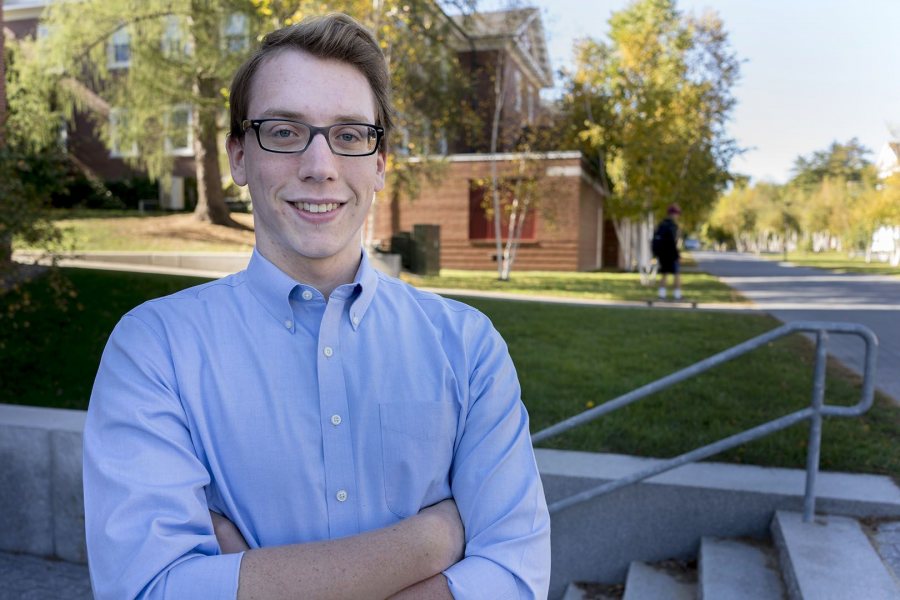
A Bobcat First! participant last year and a peer mentor this year, Ryan Lizanecz ’20 of Portland, Maine, poses on Alumni Walk. For him, the program for first-gen students made “everything so much easier.” (Phyllis Graber Jensen/Bates College)
Also during the first week, a campus scavenger hunt powered by the GooseChase app helped the newbies learn Bates landmarks. (Overheard during the hunt: “The lake is over there.” “You mean the Puddle?”) But the hunt was also intended to help the students learn about each other.
“I couldn’t imagine living the first year at Bates without knowing the group first,” says participant Jinzhi Wei ’20 of Liuzhou, China. “I was lucky to find people that can empathize and resonate with me.”
“I found the closest group of Bates friends that I have” through the program, Lizanecz says. “We all stay in touch. We can always talk to each other.”
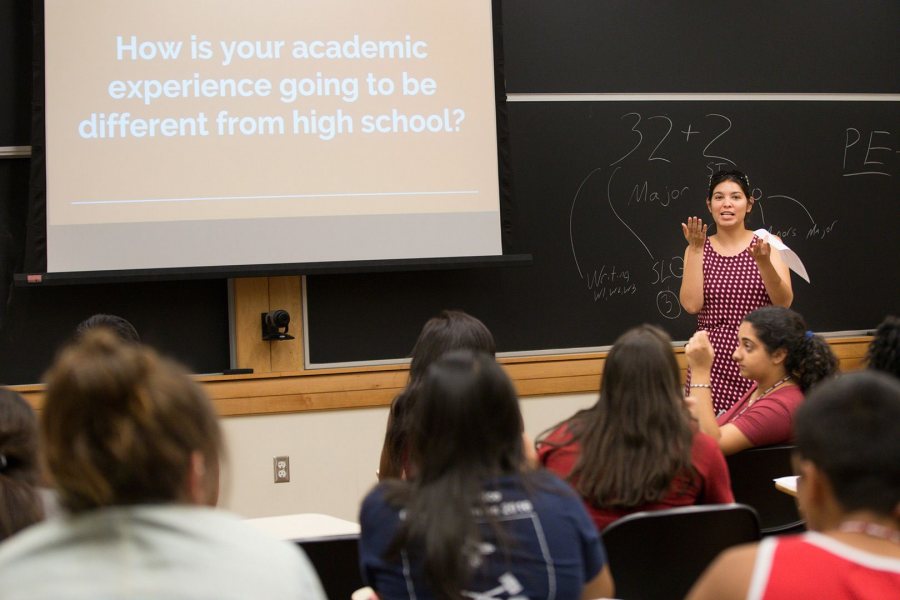
Jessica Perez, Bobcat First! co-director and assistant dean of students for student transition and support, works with first-generation students in August 2016. (Phyllis Graber Jensen/Bates College)
In short, making connections both within the B1st cohort and beyond it is key to the program. And it’s connection-building on a broad scale.
During Back to Bates Weekend, in September, the Office of Intercultural Education hosted a reception for B1st students and their families. It was a warm and festive event attended by President Spencer and members of the college’s senior staff.
Parents “want to connect with someone,” says De Los Santos. “They are really thoughtful and want to be a part of the process. We tell parents that this is also for them, this is their process — ‘This is a celebration not just of your student, but of yourselves. This is a family accomplishment.’”
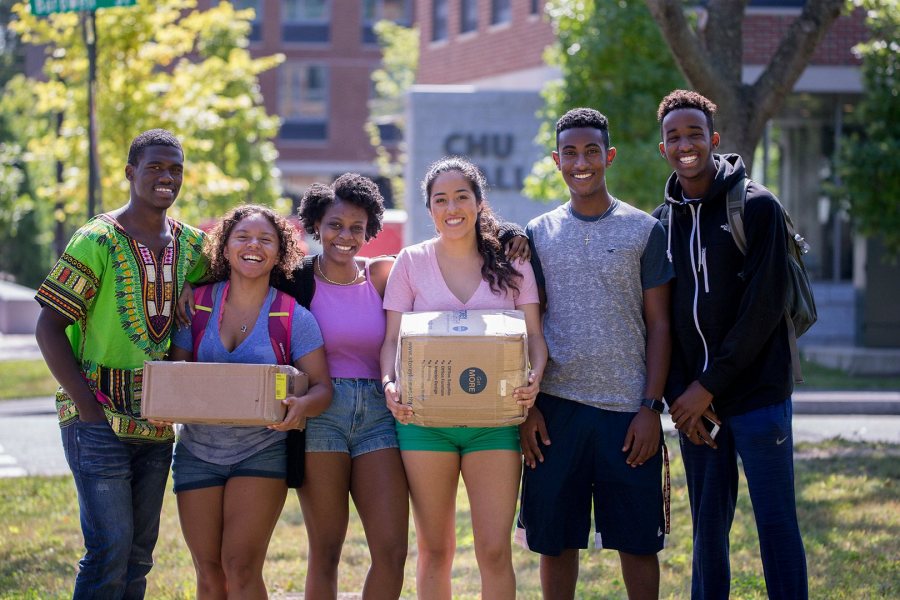
It’s an impromptu meeting of Bobcats First! members from the Class of 2021 and program mentors on Campus Avenue on Aug. 24. From left: Kyle Larry ’21, Samantha Alexander ’20, Doris Etienne ’20, Anais Gonzalez ’20, Lebanos Mengistu ’21, and Samatar Iman ’21. (Phyllis Graber Jensen/Bates College)
B1st students also meet alumni who were themselves first-gen students at Bates. As De Los Santos says, the Bates education is “not just about their experience here but beyond.” And first-gens also often lack the career-enhancing social connections that accompany a family history of higher education.
“It’s great to hear from alumni who are first-gen,” De Los Santos says. “They talk about their first jobs, and how you negotiate a salary. Or, if you have multiple, intersectional identities, how does that play out in a position?”
“Your first-gen identity, you essentially carry it for the rest of your life.”
Herself a first-gen student, De Los Santos adds, “Sometimes first-gens and their parents have a very linear way of thinking of careers. In my family it was a lot about, doctor, lawyer — careers that we were familiar with. And alumni allow students to think creatively about using what you have learned here and about your purpose in life.” (A theme echoed in Bates’ Purposeful Work programming.)
Lizanecz agrees. “I discovered through alumni that not all their paths were so clear-cut,” he says. “Maybe you don’t have to do everything perfectly to get where you want to be. That was really important, and for me it was an eye-opening experience.”
By example as much as anything, Bobcat First! also imparts signature Bates values — community and diversity. “I’ve seen that through this program very easily,” as Lizanecz says. And in keeping with the fundamental Bates notion of the transformational power of differences, the program encourages its participants to embrace their first-gen identity, rather than feeling like it’s something they have to compensate for.
“Your first-gen identity, you essentially carry it for the rest of your life,” De Los Santos says. “You can name it and let them know, ‘A lot of other folks are feeling how you’re feeling, and struggling the same ways that you’re struggling, and this is why.’” (A total of 235 Bates students are first-generation.)
“It’s really rewarding to see them get invested in the Bates community,” says Perez, “and find ways to become leaders here, and do things that they might not have thought that they would do otherwise.
“They bring a lot of strength and grit with them,” she says. “These students are often very proud and excited that they can be here. And they should be.”
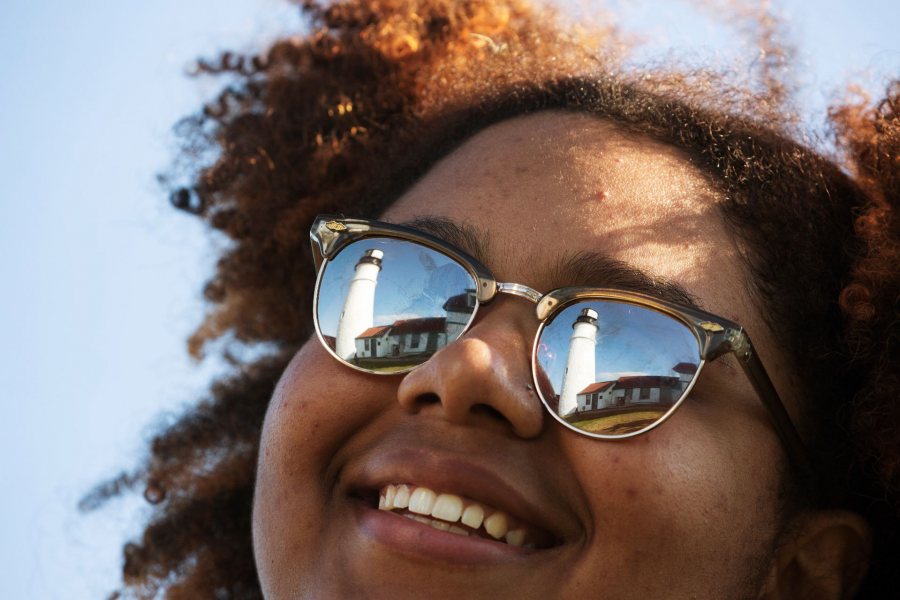
A Maine landmark is reflected in sunglasses worn by Perla Figuereo ’21 of the Bronx, N.Y., during a visit to Portland Head Light, in Cape Elizabeth. Members of Bates’ Bobcat First! program took part in a Greater Portland day trip during the program’s August 2017 pre-orientation week. (Theophil Syslo/Bates College)


